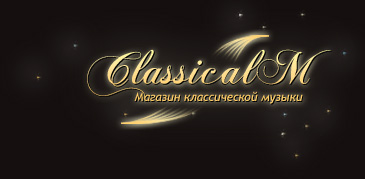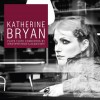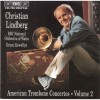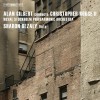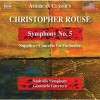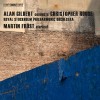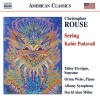| Страна: | Не выбрано |
| Период: | Современная классическая музыка |
БИОГРАФИЯ
Christopher Rouse (born February 15, 1949) is an American composer.
Rouse was born in Baltimore, Maryland, and studied with Richard Hoffmann at Oberlin Conservatory of Music, graduating in 1971. He later completed graduate degrees under Karel Husa at Cornell University in 1977. In between, Rouse studied privately with George Crumb. Early recognition came from the BMI Foundation's BMI Student Composer Awards in 1972 and 1973. Rouse taught at the University of Michigan from 1978 to 1981, where he was also a Junior Fellow in the University's Society of Fellows, and at the Eastman School of Music from 1981 to 2002. Since 1997 he has taught at the Juilliard School. Rouse's Symphony No. 1 was awarded the Kennedy Center's Friedheim Award in 1998, and his Trombone Concerto was awarded the 1993 Pulitzer Prize for Music. In 2002, Rouse was elected to the American Academy of Arts and Letters. Also in that year he won a Grammy for best contemporary composition for his Concert de Gaudi. He was named Musical America's Composer of the Year in 2009 and the New York Philharmonic's Composer-in-Residence in 2012. Rouse has also served as Composer-in-Residence with the Baltimore Symphony Orchestra (1985–88), the Tanglewood Music Festival (1997), the Helsinki Biennale (1997), the Pacific Music Festival (1998), and the Aspen Music Festival (annually since 2000).
Rouse's music has been recorded by numerous major classical music labels, including Telarc, Koch, Sony, RCA Victor, Nonesuch, Teldec, BIS and Ondine.
His notable students include Michael Torke, Nico Muhly, Kamran Ince, Marc Mellits, Robert Paterson, Jude Vaclavik, Kevin Puts, D. J. Sparr, and Joseph Lukasik.
Rouse has four children: Angela, Jillian, Alexandra, and Adrian.
Rouse is commonly described[weasel words] as a neoromantic composer. Some of his works are predominantly atonal (e.g., "Gorgon", Concerto for Orchestra) while others are clearly tonal ("Karolju", "Rapture"). Most often he seeks to integrate tonal and non-tonal harmonic worlds, as in his concerti for flute, oboe, and guitar. Rouse has been praised for his orchestration, particularly with percussion.[1] He often quotes other composers' works (e.g., his Symphony No. 1, composed in 1986, incorporates quotations of Bruckner and Shostakovich), and his music also sometimes shows the influence of rock. In general his work is notable for the intensity of its expression.[2][not in citation given]
Rouse's oldest extant works are two brief pieces for percussion ensemble, both inspired by mythological subjects: "Ogoun Badagris" (1976, Haitian) and "Ku-Ka-Ilimoku" (1978, Polynesian); a later percussion score inspired by rock drumming, "Bonham", was composed in 1988. The early 1980s found him creating a harrowing series of compositions in fast tempi and an often astringent harmonic language, all in the service musical savagery and brutality. Rouse described these pieces as an attempt "to bring back the allegro",[this quote needs a citation] having come to feel that the composition of extended music in fast tempi was becoming a lost art. Works such as his String Quartet No. 1 of 1982 (five connected movements, all fast) and his 1984 orchestral piece Gorgon typify this style. After composing Phaethon in 1986, Rouse moved in the opposite direction, creating his Symphony No. 1, a one-movement composition entirely in slow tempo. This ushered in a series of works that explored the darker aspects of the human condition. Although his harmonic language now had more recourse to the use of tonality, the expressive intent was often a tragic one.[citation needed]
The death of Leonard Bernstein in 1990 was the first in a series of deaths that made a profound impression on Rouse, and his Trombone Concerto (1991) became the first score of his so-called "Death Cycle", a group of pieces that all served as reactions to these deaths. Subsequent scores memorialized William Schuman (Violoncello Concerto - 1992), James Bulger, the two-year-old English boy abducted from a mall and subsequently murdered by two ten-year-old boys (Flute Concerto - 1993), the composer Stephen Albert (Symphony No. 2 - 1994), and Rouse's mother ("Envoi" - 1995). His pieces from the second half of the 1990s represented a conscious effort "to look towards the light", in the composer's words.[this quote needs a citation] These more optimistic and life-affirming works include Compline (1996), Kabir Padavali (1997), the Concert de Gaudi (1998), and Rapture (2000).
Since 2000 Rouse has followed an unpredictable path. His thorny Clarinet Concerto (2001) contrasts markedly with the pop-inflected humor of The Nevill Feast (2003). Lush neoromantic works like the Oboe Concerto of 2004 stand alongside twelve-tone experiments (Concerto for Orchestra, 2008). The most significant work of these years is his 90-minute Requiem (2002), a piece Rouse considers his valediction and one that evidences his music's wide stylistic variety. Recent years have seen him embrace a personal system of translating alphabetical letters into musical pitches, thereby allowing him to musically "spell" various names, events, or other words and phrases. The most thoroughgoing use of this system can be found in his 2009 composition Odna Zhizn as well as in his Symphony No. 3.



